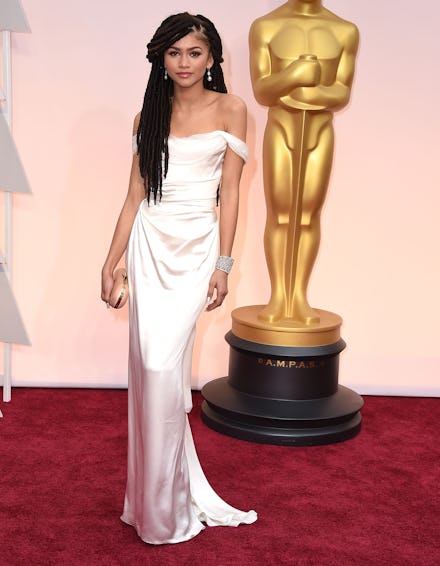Disney Star's Response to Criticism of Her Dreadlocks Deserves a Standing Ovation

E's Fashion Police, co-hosted by Giuliana Rancic, Kelly Osbourne, Brad Goreski and Kathy Griffin, is notorious for harping on celebrities' — especially female celebrities' — looks. But the show brought its shallow evaluations of women's bodies to a particularly racist level during Sunday night's Oscar ceremony, when it came time to talk about Disney star Zendaya Coleman.
The 18-year-old actress and singer, who is biracial, walked the red carpet in a pink satin gown and wore her hair in long, flowing dreadlocks. In response, Rancic said that the hairstyle indicated that Zendaya probably smelled like "patchouli oil" or "weed."
Watch the clip:
In associating Zendaya's appearance with drug use, Rancic played into deeply entrenched stereotypes about people of color and drugs. Though perhaps made in passing, the comment was reflective of systemic biases that impact the lives of people of color, and therefore, should not be taken lightly.
As many enraged Twitter users noted, Rancic's comments also exemplified a double standard when it comes to women of color and their hair: When Kylie Jenner, a white woman, wore a similar hairstyle, Rancic deemed it "edgy."
Zendaya countered the racist ignorance Monday night by tweeting an eloquent response to Rancic's comments:
"There is already harsh criticism of African-American hair in society without the help of ignorant people who choose to judge others based on the curl of their hair. My wearing my hair in locs on an Oscar red carpet was to showcase them in a positive light, to remind people of color that our hair is good enough."
Zendaya's comments beautifully address the fact that many women of color have a complex relationship to their hair, which is politicized in a way white women's hair is not. She highlights the fact that women of color should not have to hold themselves to a Western standard of beauty, while simultaneously decrying the racist ignorance that perpetuates such a standard in the first place.
An inadequate apology: Clearly catching on to the (rightful) rage surrounding her comments, Rancic backpedalled on Twitter.
Although well-intentioned, Rancic's apology fails to take full responsibility for her actions, nor does she appear to learn from her mistake. By placing the blame of her remarks on the fashion industry and framing the problem itself as people being offended, Rancic implicitly denies the racist implications of what she said. She joins a legacy of those in positions of privilege who apologize for offending rather than for the offensive sentiment.
The takeaway: This incident speaks to why campaigns like #AskHerMore, a social media effort during the Oscars that encouraged reporters to ask celebrities more substantive questions on the red carpet, are valuable. Zendaya should not have been put into a position in which she felt compelled to defend her physical appearance, but the beauty and intelligence of her defense serves as an example of how much we gain when we discard harassment, shirk objectification and ask women to speak up instead.
Update (Feb. 25): Later on Tuesday, Rancic issued an apology via E's YouTube channel. This time, Rancic more fully copped to her mistake:
I do understand something I said last night did cross the line. I just want everyone to know that I didn't intend to hurt anybody. But I've learned it is not my intent that matters; it's the result. And the result is that people are offended, including Zendaya. That is not OK.
Zendaya accepted Rancic's apology on Wednesday via Twitter, writing, "Giuliana, I appreciate your apology and I'm glad it was a learning experience for you and for the network. I hope that others negatively affected by her words can also find it in their hearts to accept her apology as well."
She then quoted Martin Luther King Jr. "Darkness cannot drive out darkness, only light can do that. Hate cannot drive out hate, only love can do that."
She concluded, "Let's be that light and spread that love."
h/t BuzzFeed